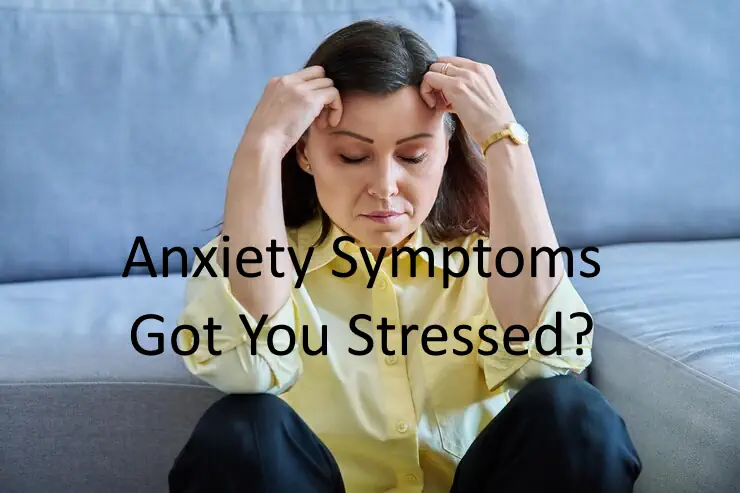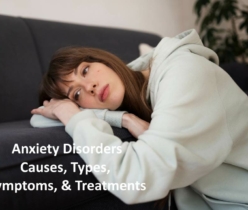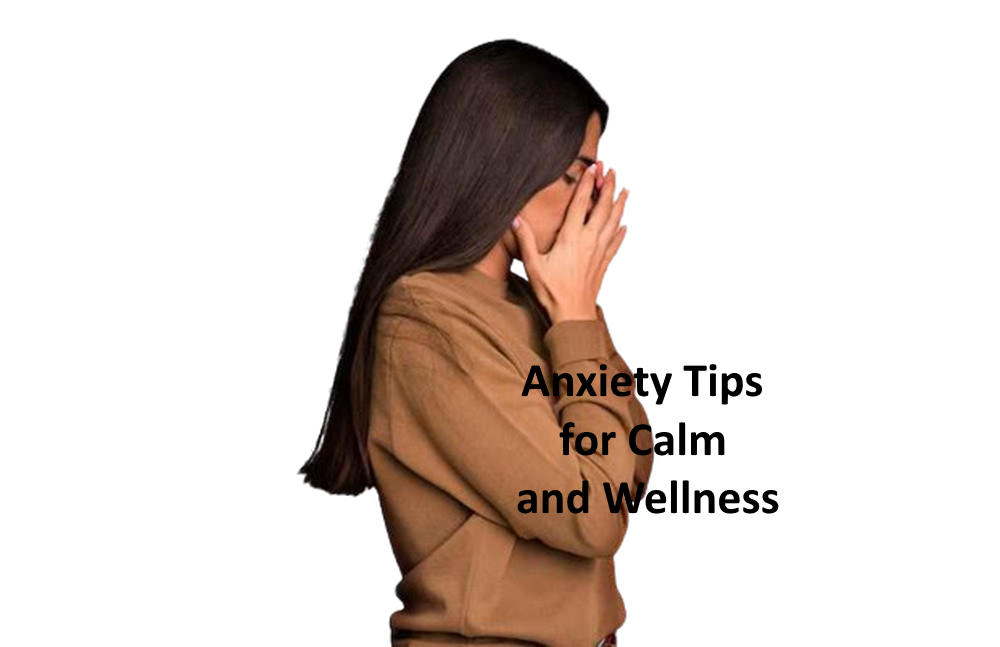Anxiety Symptoms: Most people experience some feelings of stress and anxiety at some point, and that isn’t necessarily a “bad” thing. After all, stress and anxiety can sometimes be a helpful motivator to accomplish daunting tasks or do things you’d rather not (but really should). However unmanaged stress and anxiety can start to interfere with your daily life and take a toll on your mental and physical health.
Key Takeaways
- Stress and anxiety are related but distinct emotional responses, with stress typically caused by an external trigger and anxiety often persisting without a clear cause.
- Common symptoms of stress and anxiety include trouble sleeping, digestive issues, difficulty concentrating, muscle tension, and irritability or anger.
- Both stress and anxiety can be managed through lifestyle changes, therapeutic approaches, and medications.
- Identifying whether your symptoms are due to stress or anxiety can help in choosing the most effective management and treatment options.
- It’s important to seek professional help if stress and anxiety begin to interfere significantly with your daily life, relationships, or physical health.
Understanding the Difference Between Stress and Anxiety

Defining Stress
Stress is any demand placed on your brain or physical body. Any event or scenario that makes you feel frustrated or nervous can trigger it. Stress is a typical and healthy reaction to an identifiable event that’s making you nervous, such as an upcoming test, presentation, wedding, or other major change in your life. Stress will go away once the trigger goes away.
Defining Anxiety
Anxiety is a feeling of fear, worry, or unease. While it can occur as a reaction to stress, it can also happen without any obvious trigger. Anxiety, on the other hand, persists beyond any trigger and may exist without a known trigger. A person may need treatment for anxiety to go away.
Key Differences
Stress and anxiety are both a part of the body’s natural fight-or-flight response. When someone feels under threat, their body releases stress hormones. However, while stress is a response to external pressure, anxiety can occur without any identifiable stressor. Both stress and anxiety involve mostly identical symptoms, including:
- Trouble sleeping
- Digestive issues
- Difficulty concentrating
- Muscle tension
- Irritability or anger
Knowing the difference can ensure you get the help you need.
Common Symptoms of Stress and Anxiety

Physical Symptoms
Stress and anxiety can produce a range of physical symptoms. When someone is stressed, they may experience:
- Faster heartbeat
- Faster breathing
- Muscle tension
- Digestive issues, including nausea and diarrhea
- Trouble sleeping
- Headaches
- Increased sweating
- Dizziness
Anxiety symptoms can involve the same physical symptoms as stress, in addition to:
- A feeling of impending doom
- Tingling or numbness
- Brain fog
Emotional Symptoms
Both stress and anxiety can lead to emotional and mental (psychological) symptoms, such as:
- Moodiness, irritability, or anger
- General unhappiness
- A feeling of being overwhelmed
- Loneliness
- Anxious thoughts
- Depression
Behavioral Symptoms
Behavioral changes are also common when dealing with stress and anxiety. These may include:
- Restlessness
- Changes in appetite
- Avoidance of responsibilities
- Increased use of alcohol, drugs, or other substances
- Social withdrawal
- Procrastination
It’s important to recognize these symptoms early to manage stress and anxiety effectively.
Causes and Triggers

External Triggers
Stress is typically caused by an external trigger. This trigger can be short-term, such as a work deadline or a fight with a loved one, or long-term, such as being unable to work, discrimination, or chronic illness. If you can tie your feelings back to a specific trigger, they’re likely the result of stress.
Internal Triggers
Anxiety can be caused by a combination of genetic, environmental, and personal factors. Certain health issues, such as asthma, chronic pain, diabetes, drug withdrawal, heart disease, hyperthyroidism, or irritable bowel syndrome, can also be internal triggers. Chronic stress, drug or alcohol abuse, family history of anxiety disorders, medication side effects, other mental health issues like depression, personality traits, and trauma or abuse are also significant internal triggers.
Chronic Stress and Anxiety
I can have a profound impact on your daily life. When the exact cause isn’t clear, or your symptoms stick around after the initial trigger goes away, it may be anxiety. Repeated panic or anxiety attacks may indicate a panic disorder. It’s important to recognize these patterns and seek appropriate help if needed.
At any moment, someone’s aggravating behavior or our own bad luck can set us off on an emotional spiral that threatens to derail our entire day. Here’s how we can face our triggers with less reactivity so that we can get on with our lives.
Impact on Daily Life

Work and Productivity
Anxiety and stress can significantly affect your work and productivity. Chronic stress can lead to burnout, making it difficult to focus on tasks and meet deadlines. This can result in decreased job performance and even job loss. Additionally, anxiety can cause procrastination and avoidance behaviors, further impacting your professional life.
Relationships
Stress and anxiety can strain relationships with family, friends, and colleagues. When you’re constantly worried or stressed, it can be challenging to communicate effectively and maintain healthy relationships. This can lead to misunderstandings, conflicts, and even the breakdown of important relationships.
Physical Health
The impact of anxiety and stress on physical health is profound. Chronic stress can lead to a variety of health issues, including heart disease, high blood pressure, and weakened immune function. Anxiety can also cause physical symptoms such as headaches, muscle tension, and gastrointestinal problems. Taking care of your mental health is crucial for maintaining overall well-being.
It’s hard to step out of this mode when busyness is seen as the new normal. Finding ways to manage stress and anxiety is essential for a healthier, more balanced life.
Management and Treatment Options

Lifestyle Changes
Lifestyle changes can play a significant role in managing stress and anxiety. Regular exercise is known to reduce symptoms by releasing endorphins, which are natural mood lifters. Additionally, maintaining a balanced diet and ensuring adequate sleep can help stabilize your mood and energy levels. Mindfulness practices, such as yoga and meditation, are also effective in reducing stress.
Therapeutic Approaches
Therapeutic approaches are essential for treating anxiety disorders. Cognitive Behavioral Therapy (CBT) is one of the most widely used methods, focusing on changing maladaptive thought patterns. Exposure therapy is another effective technique, which involves confronting anxiety triggers in a controlled environment. Online therapy options are also available, making it easier to access professional help.
Medications
Medications can be an important part of treatment. Doctors often prescribe antianxiety and antidepressant drugs. Some commonly used medications include:
- Selective serotonin uptake inhibitors (SSRIs): Escitalopram, fluoxetine, and paroxetine.
- Selective norepinephrine reuptake inhibitors (SNRIs): Duloxetine and venlafaxine.
- Antipsychotics: Quetiapine and aripiprazole.
- Benzodiazepines: Diazepam and clonazepam.
- Anxiolytics: Buspirone.
Treatment usually consists of a combination of pharmacotherapy and/or psychotherapy. Antidepressant agents are the medications of choice in many cases.
It’s important to consult with a healthcare provider, such as an optometrist, to determine the best course of action for your specific needs.
When to Seek Professional Help

Identifying Severe Symptoms
It’s best to talk with a mental health professional any time stress or anxiety starts to affect your day-to-day life. Marked personality changes, eating or sleeping patterns, or feeling hopeless are significant indicators. If you start having thoughts of harming yourself or others, seek help immediately.
Finding the Right Professional
Your doctor may refer you to a psychologist (counselor) or psychiatrist (medical doctor) for evaluation and treatment. A mental health professional can teach you techniques to help you put things in perspective. They can offer you a more objective look at the events in your life and help you distinguish between normal anxiety and extreme stages of anxiety.
What to Expect in Treatment
Professional treatment doesn’t replace self-help. To control your symptoms, you’ll still want to make lifestyle changes and look at the ways you think about worrying. Cognitive behavioral therapy, exposure therapy, and other options are available. BetterHelp makes starting therapy easy. Take the assessment and get matched with a professional, licensed therapist.
If you’re having thoughts of harming yourself or ending your life, know that you’re not alone. You can access free, confidential support 24/7 by reaching out to a crisis helpline.
Preventive Measures

Healthy Habits
Adopting healthy habits is crucial for preventing stress and anxiety. Regular exercise, a balanced diet, and adequate sleep can significantly improve your mental health. Avoiding excessive caffeine and alcohol can also help maintain a stable mood.
Mindfulness and Relaxation Techniques
Practicing mindfulness and relaxation techniques can be highly effective in managing stress. Techniques such as meditation, deep breathing exercises, and yoga can help you stay grounded and reduce anxiety levels. These practices can be particularly beneficial for those dealing with chronic stress.
Building a Support System
Having a strong support system is essential for mental well-being. Surround yourself with friends and family who can offer emotional support. Joining support groups or seeking counseling can also provide valuable assistance. Remember, it’s important to communicate openly and honestly about your feelings.
Building a support system can make a significant difference in managing stress and anxiety. Don’t hesitate to reach out for help when you need it.
Conclusion
Understanding the nuances between stress and anxiety is crucial for managing both effectively. While stress is often a response to an external trigger and can sometimes be beneficial, anxiety tends to persist and may not always have a clear cause. Both can manifest through similar symptoms such as trouble sleeping, digestive issues, and irritability. Recognizing whether you are dealing with stress or anxiety can help you take the appropriate steps to manage your mental health. Whether it’s through relaxation strategies, seeking professional help, or making lifestyle changes, addressing these feelings head-on can significantly improve your quality of life.
Frequently Asked Questions
What is the difference between stress and anxiety?
Stress is typically caused by an external trigger and tends to be short-term. Anxiety, on the other hand, can persist beyond any trigger and may exist without a known cause.
What are the common symptoms of stress and anxiety?
Common symptoms include trouble sleeping, digestive issues, difficulty concentrating, muscle tension, and irritability or anger.
Can stress turn into anxiety?
Yes, stress can sometimes develop into anxiety. Stress is the body’s reaction to a threat, and anxiety can be the body’s reaction to prolonged stress.
What are some common causes of stress and anxiety?
Common causes include big life changes, work deadlines, financial difficulties, relationship issues, and health concerns.
How can I manage stress and anxiety?
Management strategies include lifestyle changes, therapeutic approaches, medications, relaxation techniques, and building a support system.
When should I seek professional help for stress and anxiety?
You should seek professional help if you experience severe symptoms that interfere with daily life, such as persistent feelings of worry or fear, and if these symptoms do not go away on their own.
Meta Description
Learn the differences between stress and anxiety, their symptoms, causes, impacts, and management options.




